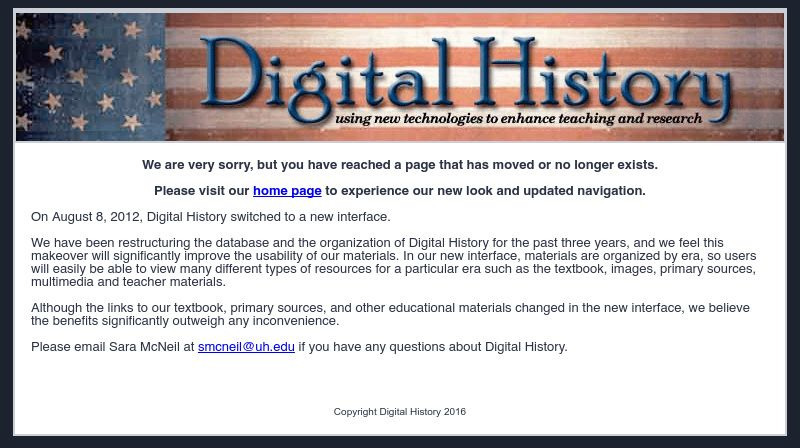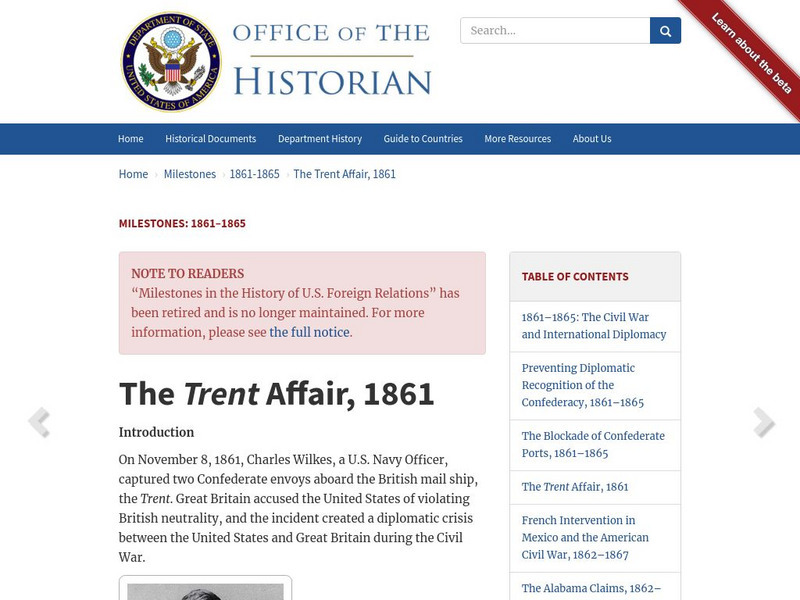Hi, what do you want to do?
Curated OER
Thomas Jefferson on the Sedition Act
Students research and cite arguments Jefferson used in objecting to the Sedition Act. They discuss Jefferson's opinion on how constitutional questions about the Sedition Act could be resolved.
Curated OER
Acids, Bases, and Indicators
Chemistry or physical science fledglings get comfortable identifying acids and bases with a variety of pH indicators. They discover that different indicator solutions have different ranges, practice testing soil acidity, and use antacids...
Bismarck Public Schools
Jefferson & the Louisiana Purchase
After learning about the Louisiana Purchase, assess your class members' understanding of Napoleon Bonaparte's involvement, states included in the purchase, and important key terms (i.e. neutrality, corps of discovery, etc.) associated...
Curated OER
Bill of Rights
Students research, list, define and discuss all the aspects to the United States Bill of Rights. They assess their foundations by James Madison and Thomas Jefferson and reflect on all the conditions happening at the time period of...
Curated OER
Graphic Organizing: Early American History
In collaborative groups, young US historians sort cards (each labeled with a single early American event or issue) according to which of the first four presidents was leading the country at the time. Learners copy the events onto a...
National Endowment for the Humanities
Lesson 3: Britain, Napoleon, and the American Embargo, 1803–1808
While the French were once the allies of Americans, the Napoleonic Wars saw the United States almost drawn into a war with its one-time friend. Wars in Europe threatened to draw in the early republic. A primary source-based activity...
National Endowment for the Humanities
Lesson 2: The Debate in Congress on the Sedition Act
Pupils research and discuss the provisions in the Constitution that supported the arguments for and against the Sedition Act. They articulate objections to and arguments in favor of the Sedition Act.
Constitutional Rights Foundation
The War of 1812: America’s First Declared War
Free Trade and Sailor's Rights! Pupils dive into America's first declared war, the War of 1812. They analyze the presidencies of Jefferson and Madison through diary entries and historical reasoning. To conclude the lesson, they use their...
Curated OER
Virginians in the Revolutionary War Era
Students identify the varied roles of Virginians in the Revolutionary War era and define the terms patriot, loyalist, and neutral. They then pretend they are patriots and list reasons on a chart why they are fighting against England and...
Curated OER
Worksheet Quiz #60 - Impressment and Embargo
In this impressment and embargo historical term quiz, learners define the meaning of several terms so that they may further their own historical knowledge on the aforementioned topic.
Curated OER
Consequences of the Sedition Act
Students research and discuss the consequences of the Sedition Act. They illustrate the difficulty of balancing security needs and personal freedom using an example from John Adams's presidency.
Curated OER
The War for Independence: 4th Grade
Here is a great interactive idea that may need a little refining. Students play 3 rounds, where they answer questions explaining how different countries have gained independence throughout history. While this resource has music and...
Curated OER
From the President's Lips: The Concerns that Led to the Sedition (and Alien) Act
Young scholars research and briefly summarize the international situation during John Adams's presidency. They list the concerns that led to the Sedition Act and describe it.
Curated OER
James Madison
In this online interactive history worksheet, students respond to 8 essay questions about the accomplishments of James Madison.
Curated OER
The American People, “Creating a Nation”
In this early American history worksheet, students read noted pages in their textbooks and then respond to 7 short answer questions regarding the U.S. Constitution and its formation.
Curated OER
Pop Art Ice Cream Painting
Students develop skills in painting and create a painting of an ice cream cone using Pop Art as in inspiration.
Curated OER
George Washington on the Sedition Act
Students investigate the Sedition Act and George Washington's position on the act. In this United States Colonial history lesson, students read about George Washington's position on the Sedition Act. Students then participate in a...
Curated OER
Chapter 2 – The US From 1789 to 1815
In this U.S. history worksheet, students read assigned textbook pages about the country from 1789-1815 and respond to 36 short answer questions.
US Department of State
Office of the Historian: The Citizen Genet Affair
Washington's foreign affair policy was motivated by the crisis between France and Britain. Edmond Charles Genet was the foreign minister to the United States who was recalled due to defiant actions. Read how this spectacle solidified...
Digital History
Digital History: Neutrality and the Jay Treaty [Pdf]
See why a war between Great Britain and France showed the vulnerablity of the new United States. Should the United States help France, after that country gave so much in the Revolutionary War, and risk the economic and military enmity of...
Digital History
Digital History: The Embargo of 1807
Thomas Jefferson tried to retain American neutrality in relations with France and Great Britain, who were at war with each other. Read about the Embargo Act and its effect on the American economy. See how other acts enacted in the...
Digital History
Digital History: Jeffersonians in Office [Pdf]
This is a great overview of both the Jefferson Administration and the Madison administration. Read about the Louisiana Purchase, trade problems, the War of 1812, and the downfall of the Federalists. A great resource. [pdf]
Other
Encyclopedia of American Foreign Policy: Civil War Diplomacy
An article by noted historian, Kinley Brauer, discusses the role of foreign policy for both the North and the South in the Civil War. An interesting, and often forgotten, aspect of the war.
US Department of State
Office of the Historian: The Trent Affair, 1861
Find out about the diplomatic crisis between the United States and Great Britain at the beginning of the Civil War, why it was important to the North and South, and how it was resolved.
























![Digital History: Neutrality and the Jay Treaty [Pdf] Website Digital History: Neutrality and the Jay Treaty [Pdf] Website](https://static.lp.lexp.cloud/images/attachment_defaults/resource/large/FPO-knovation.png)


